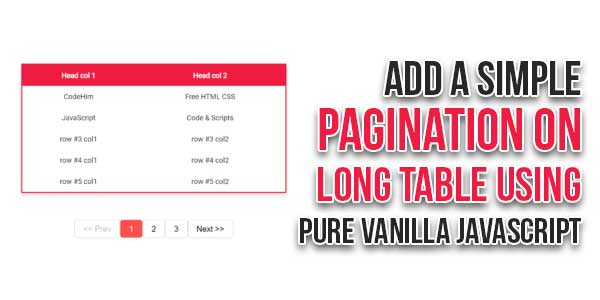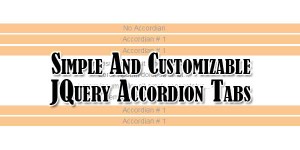
This JavaScript code snippet helps you to create simple table pagination. It allows you to define table rows per page and generate paging accordingly. You need to create an HTML table element with rows and columns then this pagination plugin automatically renders pages for it.
There are many code snippets available online or on many other blogs and websites, but everyone cannot optimize your blog or website, so you need some optimized code snippets. So now checkout out the code snippet for your blog and website that will give you all features for your desired code. Now grab the ready-to-use code and paste it where you want.
Table of Contents
Features:
- Light Weight.
- Pure JavaScript.
- Cross Browser.
- No JQuery Files.
- Fully Customizable.
- Responsive.
How To Add A Simple Pagination On Long Table Using Pure Vanilla JavaScript?
There are a few easy and understandable steps to achieve your desired functionality that we are gonna share below. Follow each step perfectly.
CSS:
<style type="text/css">
* {
margin: 0;
padding: 0;
text-align:center;
}
body {
background-color: #fafafa;
}
table {
color: #333;
font-size: .9em;
font-weight: 300;
line-height: 40px;
border-collapse: separate;
border-spacing: 0;
border: 2px solid #ed1c40;
width: 500px;
margin: 50px auto;
box-shadow: 0 4px 8px 0 rgba(0,0,0,.16);
border-radius: 2px;
}
th {
background: #ed1c40;
color: #fff;
border: none;
}
tr:hover:not(th) {background-color: rgba(237,28,64,.1);}
input[type="button"] {
transition: all .3s;
border: 1px solid #ddd;
padding: 8px 16px;
text-decoration: none;
border-radius: 5px;
font-size: 15px;
}
input[type="button"]:not(.active) {
background-color:transparent;
}
.active {
background-color: #ff4d4d;
color :#fff;
}
input[type="button"]:hover:not(.active) {
background-color: #ddd;
}
</style>HTML:
<table id="myTable"> <tr> <th>Head col 1</th> <th>Head col 2</th> </tr> <tr> <td>CodeHim</td> <td>Free HTML CSS</td> </tr> <tr> <td>JavaScript</td> <td>Code & Scripts</td> </tr> <tr> <td>row #3 col1</td> <td>row #3 col2</td> </tr> <tr> <td>row #4 col1</td> <td>row #4 col2</td> </tr> <tr> <td>row #5 col1</td> <td>row #5 col2</td> </tr> <tr> <td>row #6 col1</td> <td>row #6 col2</td> </tr> <tr> <td>row #7 col1</td> <td>row #7 col2</td> </tr> <tr> <td>row #8 col1</td> <td>row #8 col2</td> </tr> <tr> <td>row #9 col1</td> <td>row #9 col2</td> </tr> <tr> <td>row #10 col1</td> <td>row #10 col2</td> </tr> <tr> <td>row #11 col1</td> <td>row #11 col2</td> </tr> </table>
JavaScript:
<script type="text/javascript">
/* =================================
** ==== Simple Table Controller ====
** =================================
**
**
** With Pure JavaScript ..
**
**
** No Libraries or Frameworks needed!
**
**
** fb.com/bastony
**
*/
// get the table element
var $table = document.getElementById("myTable"),
// number of rows per page
$n = 5,
// number of rows of the table
$rowCount = $table.rows.length,
// get the first cell's tag name (in the first row)
$firstRow = $table.rows[0].firstElementChild.tagName,
// boolean var to check if table has a head row
$hasHead = ($firstRow === "TH"),
// an array to hold each row
$tr = [],
// loop counters, to start count from rows[1] (2nd row) if the first row has a head tag
$i,$ii,$j = ($hasHead)?1:0,
// holds the first row if it has a (<TH>) & nothing if (<TD>)
$th = ($hasHead?$table.rows[(0)].outerHTML:"");
// count the number of pages
var $pageCount = Math.ceil($rowCount / $n);
// if we had one page only, then we have nothing to do ..
if ($pageCount > 1) {
// assign each row outHTML (tag name & innerHTML) to the array
for ($i = $j,$ii = 0; $i < $rowCount; $i++, $ii++)
$tr[$ii] = $table.rows[$i].outerHTML;
// create a div block to hold the buttons
$table.insertAdjacentHTML("afterend","<div id='buttons'></div");
// the first sort, default page is the first one
sort(1);
}
// ($p) is the selected page number. it will be generated when a user clicks a button
function sort($p) {
/* create ($rows) a variable to hold the group of rows
** to be displayed on the selected page,
** ($s) the start point .. the first row in each page, Do The Math
*/
var $rows = $th,$s = (($n * $p)-$n);
for ($i = $s; $i < ($s+$n) && $i < $tr.length; $i++)
$rows += $tr[$i];
// now the table has a processed group of rows ..
$table.innerHTML = $rows;
// create the pagination buttons
document.getElementById("buttons").innerHTML = pageButtons($pageCount,$p);
// CSS Stuff
document.getElementById("id"+$p).setAttribute("class","active");
}
// ($pCount) : number of pages,($cur) : current page, the selected one ..
function pageButtons($pCount,$cur) {
/* this variables will disable the "Prev" button on 1st page
and "next" button on the last one */
var $prevDis = ($cur == 1)?"disabled":"",
$nextDis = ($cur == $pCount)?"disabled":"",
/* this ($buttons) will hold every single button needed
** it will creates each button and sets the onclick attribute
** to the "sort" function with a special ($p) number..
*/
$buttons = "<input type='button' value='<< Prev' onclick='sort("+($cur - 1)+")' "+$prevDis+">";
for ($i=1; $i<=$pCount;$i++)
$buttons += "<input type='button' id='id"+$i+"'value='"+$i+"' onclick='sort("+$i+")'>";
$buttons += "<input type='button' value='Next >>' onclick='sort("+($cur + 1)+")' "+$nextDis+">";
return $buttons;
}
</script>Customization:
No need to customize it. Just copy-paste. Rest edit the code as per comments and need.
Troubleshooting the Errors:
Do it with concentration and patience. Check your all steps again and all codes or scripts. If you find any error you can contact us anytime via comment or better via email, We are always here to help you.
Final Words:
That’s all we have. We hope that you liked this article. If you have any problem with this code in your template then feel free to contact us with a full explanation of your problem. We will reply to you as time allows us If you have any doubts or problems please comment below. We are happy to help you! If you liked this article, Don’t forget to share this with your friends so they can also take benefit from it and leave.


















Be the first to write a comment.